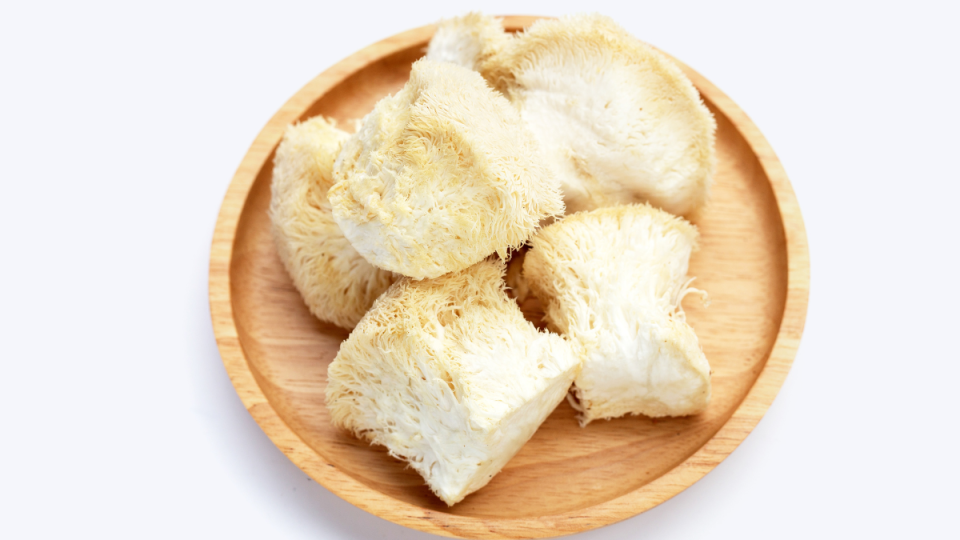Could Mushroom Coffee Be the Key to Stress-Free? Experts Weigh In on the Trendy Brew
Many of us start the day with a cup of coffee. The drink provides a much-needed energy boost, you can drink it hot or cold, and it pairs well with almost any breakfast food. But what if your morning Joe could also bolster your health? Although it might sound strange, mushroom coffee is becoming all the rage, and mushroom coffee benefits extend far beyond the caffeine! Read on to learn more about the sip, its potential health benefits and what to look for when selecting a mushroom-infused brew.
What is mushroom coffee?
Mushroom coffee contains dried functional (also known as medicinal or adaptogenic) mushrooms or functional mushroom extracts, explains Melina Jampolis, MD, PNS, CSNC, a board-certified physician nutrition specialist and the host of the Practically Healthy by Dr. Melina podcast. Sometimes, it contains mushroom extract alone, but more often than not, it also includes ground coffee. That means you still get your caffeine fix (and that delicious coffee flavor) but with some added nutritional benefits.
Mushrooms: Understanding the different types
Before we explore mushroom coffee benefits, it’s important to understand the difference between functional mushrooms (also known as medicinal or adaptogenic mushrooms) and culinary mushrooms (the mushrooms you buy at the grocery store).
“The mushrooms used in mushroom coffee are adaptogenic mushrooms, such as lion’s mane, reishi, turkey tail and cordyceps,” says Marissa Perrotta, RDN, RYT, a registered dietitian and the owner of Peacable Nutrition & Wellness. “Adaptogens are a type of root, herb or plant (like mushrooms) that may help lower stress levels and anxiety.”
Furthermore, Dr. Jampolis says adaptogenic mushrooms contain bioactive compounds and phytonutrients. In less scientific terms, they support various bodily functions, from reducing inflammation and supporting immunity to boosting brain health. Sounds pretty amazing, right?
You can cook with functional mushrooms like button mushrooms and shitakes, but manufacturers also use them in nutritional supplements, mushroom teas, and of course, mushroom coffee.

Mushroom coffee benefits: 5 ways it can support your health
Influencers promoting mushroom coffee on TikTok and Instagram make various health claims, but what does the science say? Below, we take a closer look:
1. Mushroom coffee may reduce inflammation
We all experience inflammation from time to time, but if it becomes chronic, we’re more likely to develop illnesses like heart disease, cancer,and type 2 diabetes. Since adaptogenic mushrooms are packed with nutrients, like vitamins and antioxidants, they provide a natural inflammation defense. In fact, people have been using these mushrooms to manage inflammation for thousands of years!
Remember the reishi and lion’s mane mushrooms we mentioned earlier? These two fungi are particularly effective at inflammation relief. For example, a study published in the journal Nature concluded that reishi mushrooms (Ganoderma Lucim) seem to reduce inflammation in the brain caused by lack of oxygen.
Another, from the journal Evidence-Based Complementary and Alternative Medicine, found that lion’s mane and reishi were potential sources of dietary antioxidants and angiotensin-converting enzyme (ACE) inhibitory agents. In other words, they protect against free radicals (molecules that cause disease) and help relax the veins and arteries, reducing the risk of high blood pressure.
Related: Save Those Onion Peels! Tea Made From Them Can Powerfully Lower Inflammation + Speed Weight Loss
2. Mushroom coffee may alleviate stress
Women tend to report higher stress levels than men, which may explain why we’re also more susceptible to mental health conditions, like anxiety and depression. Here, too, mushroom coffee may provide some benefits.
Consider that cordyceps (one of the most common fungi in mushroom coffee) has been shown to improve stress response and fatigue levels. Similarly, reishi mushrooms seem to have antidepressant-like effects in animal studies. Though more research needs to be done, experts say these benefits could very well translate to humans. (Click through to learn how reducing stress curbs your risk of a silent stroke, too.)
Related: Chronic Stress? Experts Say These Delicious Cortisol-Lowering Foods Can Help
3. Mushroom coffee could boost energy
Caffeine provides a quick burst of energy, but it often leads to a crash afterward. The adaptogenic mushrooms in mushroom coffee seem to counteract this effect, and science backs this theory up!
One study, published in the Chinese Journal of Integrative Medicine, tested the effects of cordyceps supplementation on exercise capacity in 37 healthy adults. Some subjects took a cordyceps supplement for six weeks, while the second group took a placebo. At the end of the trial period, 7% of adults in the cordyceps group reported increased energy, better physical fitness and less fatigue. The placebo group experienced no difference.
Chaga, another common mushroom in these brews, has similar energy-boosting effects. Experts aren’t sure of the exact mechanism, but its polysaccharides (a type of carbohydrate) may play a role. Specifically, the polysaccharides in chaga mushrooms seem to stabilize blood sugar, reducing the risk of post-breakfast energy crashes.
Related: 10 Sneaky Causes of an Afternoon Slump + Easy, Natural Ways To Boost Your Energy
4. Mushroom coffee might support cognitive function
Do you regularly lose your keys or have trouble focusing? Mushroom coffee may help combat cognitive challenges, too, especially if it contains mushrooms like lion’s mane. You see, lion’s mane mushrooms (Hericinum erinaceus) contain powerful brain-protecting properties.
One study in the International Journal of Molecular Sciences found that supplementing with lion’s mane yielded neurological benefits. Just a few of them: merve growth stimulation, reduced oxidative stress (a common cause of memory loss) and brain cell protection against cell death. Another, published in Phytotherapy Research, concluded that lion’s mane mushrooms increased brain function in men and women with mild cognitive impairment.
Related: Study: These 7 Essential Oils Boost Brainpower by 226% — How to Get the Perks
5. Mushroom coffee may enhance immunity
Dr. Jampolis says many of the fungi in mushroom coffee contain something called beta-glucans. These soluble fibers reduce the risk of heart disease, but they also support healthy immune system function, she says.
Indeed, a study published in Global Advances in Integrative Medicine and Health found that breast cancer patients who took a turkey tail mushroom supplement recovered immune function more quickly after radiation therapy than those who didn’t. Another, published in Gut Microbes, concluded that turkey tail mushrooms helped balance the gut microbiome. Since a healthy gut is essential for a strong immune system, it’s safe to assume that drinking mushroom coffee may have similarly positive immune-boosting effects.
Related: Zinc and Quercetin Dramatically Boost Your Immunity, Say Doctors — And They’re Stronger Together

What to look for in a mushroom coffee
Now that you’re familiar with some of the benefits of mushroom coffee, you’re probably wondering if there’s a blend or brand that’s best.
Perrotta’s advice: “Try to choose an organic blend, so you can enjoy all of the benefits of the mushrooms without anything added. I like to look for mushroom coffees that are sustainably sourced,” she says. Specifically, look for information about “how the mushrooms were grown and whether they were foraged, grown organically on a farm or in a lab.” Likewise, Perrotta recommends looking for brands that are USDA organic.
One to try: Four Sigmatic Think Ground Coffee. This blend contains a mix of organic log-grown lion’s mane, organic wildcrafted chaga and organic dark roast arabica coffee. Tero Isokauppila, Four Sigmatic’s founder and CEO says this combination of carefully crafted ingredients provides “increased mental focus, energy and long-term positive mood without the jitters.”
How much mushroom coffee to drink
Most mushroom coffees contain less caffeine than a normal cup of Joe, but it’s still a good idea to moderate your intake. “I’d recommend sticking with one cup a day and making sure you’re drinking enough water,” Perrotta says. “[Mushroom coffee] is meant to give you a boost, but only if it’s taken consistently. There may be other lifestyle and nutrition factors that are playing a role if you feel you’re lacking energy and focus.”
Isokauppila echoes this advice. “We recommend starting with 1-2 cups per day, or as a replacement to your existing coffee routine,” he says. However, you should “always listen to your body.” If you find that mushroom coffee upsets your stomach or makes you feel off, talk to your healthcare provider for more personalized advice.
Who should avoid mushroom coffee?
Mushroom coffee is safe and presents few risks, but it isn’t for everyone. For instance, if you have a history of kidney problems, Dr. Jampolis says you might want to hold off. That’s because “chaga mushrooms contain oxalates, which could lead to kidney stones in high doses.”
Likewise, Perrotta says research is lacking in terms of how mushroom coffee interacts with specific medications. So, if you take blood pressure medicine or anticoagulants, talk to your doctor first. You may also want to avoid mushroom coffee if you have digestive issues, like irritable bowel syndrome (IBS), as “mushrooms can be a trigger for IBS symptoms.”
Mushroom coffee benefits: The bottom line
Dr. Jampolis says mushroom coffee and other naturally occurring plant compounds offer lots of exciting potential, but research is still in its early stages. As a result, there’s a lot to learn about these powerful fungi and their healing properties.
If you aren’t a big coffee drinker, Perrotta says you can find adaptogenic mushrooms, such as lion’s mane, turkey tail and reishi at many specialty stores and online retailers. “You don’t need to spend a lot of money to enjoy the benefits of mushrooms,” she says. “Add them to a stir fry, a bolognese sauce, tacos or soup.” Most importantly: “Have fun!”
Keep reading for more information on mushroom coffee benefits!
This Tasty Morning Drink Sharpens Memory, Aids Immunity, and Boosts Energy Without the Jitters
Mushroom Coffee Sounds Weird… but How Does It Taste?
3 Morning Coffee Alternatives if You Suffer from Heartburn or Stomach Upset
This content is not a substitute for professional medical advice or diagnosis. Always consult your physician before pursuing any treatment plan.
